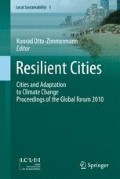Abstract
Recent climate change studies predict an increase of temperature in Central Europe. These conditions – intensified by the urban heat island effect – are expected to have consequences on the quality of human life in urban areas in the future. Urban design must respond to these changes in the urban climate and, by following the precautionary principle, must ensure that in the future thermal stress for people outdoors and indoors is reduced to a tolerable degree. The application-related basics needed for this have been developed by an interdisciplinary team from the fields of urban climatology, urban development and geoinformatics. This project aims to develop strategies and concepts for urban planning to mitigate the impacts of climate extremes on the well-being and health of city residents. In experimental analyses, surveys and simulations on the thermal comfort of people, and draft modules suitable for practical application in urban planning adapted to the climate, have been developed and summarised in a manual. Urban quarters in Germany, Brazil and Hong Kong have been selected as examinations sites.
Access this chapter
Tax calculation will be finalised at checkout
Purchases are for personal use only
References
EU RUROS Project (2004) Design guideline open space planning and comfort. CRES, Athen
Höppe P (1999) The physiological equivalent temperature – a universal index for the biometeorological assessment of the thermal environment. Int J Biometeorol 43:71–75
Katzschner L (2006) Microclimatic thermal comfort analysis in cities for urban planning and open space design, comfort and energy use in buildings. Network for Comfort and Energy use in Buildings (NCUB), London, www.nceub.or.uk
Katzschner L, Bruse M, Drey C, Mayer H (2007) Untersuchung des thermischen Komforts zur Abpufferung von Hitze durch städtebauliche Konzepte. Ber Meteorologischen Instituts Univ Freiburg 16:37–42
Katzschner L, Maas A, Schneider A (2009) Das städtische Mikroklima: analyse für die Stadt- und Gebäudeplanung, vol 31, Heft 1, Bauphysik. Ernst und Sohn Verlag, Berlin
Ng E (2010) Designing high-density cities. Earthscan, London
Nonnenmacher A (2005) AG statistische methoden der sozialwissenschaften: ordinale regression. www.metaanalyse.de. Cited 17 March 2009
Author information
Authors and Affiliations
Corresponding author
Editor information
Editors and Affiliations
Rights and permissions
Copyright information
© 2011 Springer Science+Business Media B.V.
About this paper
Cite this paper
Katzschner, L. (2011). Urban Climate Strategies Against Future Heat Stress Conditions. In: Otto-Zimmermann, K. (eds) Resilient Cities. Local Sustainability, vol 1. Springer, Dordrecht. https://doi.org/10.1007/978-94-007-0785-6_8
Download citation
DOI: https://doi.org/10.1007/978-94-007-0785-6_8
Published:
Publisher Name: Springer, Dordrecht
Print ISBN: 978-94-007-0784-9
Online ISBN: 978-94-007-0785-6
eBook Packages: Earth and Environmental ScienceEarth and Environmental Science (R0)

